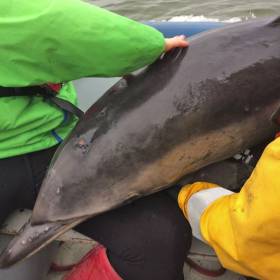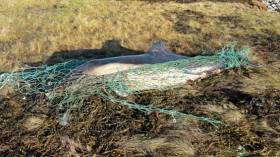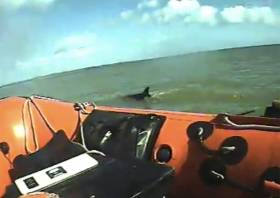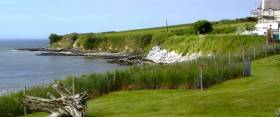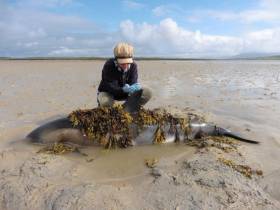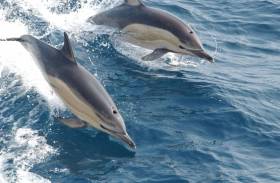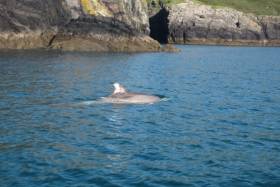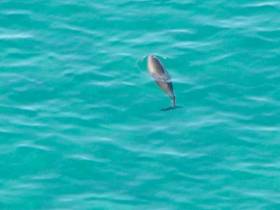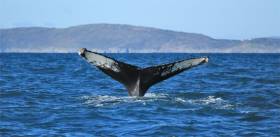Displaying items by tag: Dolphins
Dolphins Rescued In Tarbert Stranding Drama
#MarineWildlife - The Irish Whale and Dolphin Group (IWDG) reports the good news of the rescue of two live common dolphins that stranded on a Co Kerry beach at the weekend.
IWDG volunteers found three dolphins at Tarbert on Sunday morning (8 January), one of which was already dead while the others were in shallow water, with one of them swimming into even lower waters upriver towards Tarbert village.
“We knew we had to come up with a plan as the area is surrounded with mudflats, and once the tide started to recede we would not be able to get access to or re-float the dolphin if it stranded again,” reported Joanne O’Brien.
That’s when Tarbert Rowing Club came to their aid with a small inflatable that allowed the volunteers to retrieve the bewildered dolphin and steer it in the right direction.
The IWDG has more on the story HERE.
MEP Wants European Level Probe Into Alleged Supertrawler Link With Dolphin Deaths
#Supertrawler - An MEP for Ireland South is calling on the European Commission to investigate an alleged connection between ‘supertrawler’ activity and a spike in dolphin standings earlier this year.
As the West Cork Times reports, Fine Gael’s Deirdre Clune MEP has submitted a parliamentary question that makes reference to the unusually high rate of standings recorded by the Irish Whale and Dolphin Group (IWDG) in the first three months of 2016.
“The allegation is that the spike in dolphin deaths is as a direct result of a busy and sustained period of supertrawler activity in our waters,” says Clune, who adds that the Commission “now has a duty of care under the Habitats Directive to investigate this matter to establish the facts.”
Such concerns were renewed in recent weeks after the controversial super-sized trawler Margiris was spotted fishing off the North West coast.
Last week the vessel, one of the largest of its kind on the seas, was boarded for inspection by Naval Service personnel — as the Irish Wildlife Trust reiterated its calls for a full-time inspection regime for large-scale factory trawlers to ensure compliance with the Common Fisheries Policy and environmental protections.
Ballycotton Lifeboat Launches To Stranded Dolphin
#RNLI - Ballycotton RNLI launched around 1pm yesterday afternoon (Thursday 29 September) to aid a dolphin stranded in shallow water on Silver Strand beach near the East Cork village.
A member of the public who was on scene had tried to assist the dolphin back to sea, but when they were unable to do so they alerted the Ballycotton lifeboat.
Ballycotton’s inshore lifeboat and its volunteer crew were quickly on scene, with the all-weather lifeboat on standby due to the offshore breeze and calm weather conditions.
Upon arrival, coxswain Eolan Walsh entered the water, guided the marine mammal into deeper water and shepherded it back out to sea.
Speaking after the callout, Walsh said: “Similar to a previous launch last summer, this dolphin appeared to be quite young and may have been separated from its pod.
“We would like to commend the member of the public who assisted the dolphin initially. We were happy to help and bring the dolphin into deeper waters.”
Caravan Park Visitors Help Rescue Dolphins From Loop Head Beach
#MarineWildlife - Holidaymakers on the Loop Head Peninsula sprang into action to rescue two common dolphins stranded on a nearby beach, as the Irish Examiner reports.
Visitors staying at Doonaha's Green Acres caravan park used buckets of water to keep the mother and calf wet and tarps to help lift them into deeper waters off the rocky shore before a team from Shannon Dolphin and Wildlife Foundation arrived.
The Irish Examiner has more on the story HERE.
#MarineWildlife - The Irish Whale and Dolphin Group (IWDG) has reiterated the need for localised stranding plans after the death of two common dolphins that stranded in Mayo's Blacksod Bay in late July.
Aoife Foley of the IWDG writes that the two dolphins were part of a pod of five that were spotted close to the shore at Mullaghroe Beach on Saturday 23 July.
A team from the Broadhaven Bay Marine Mammal Monitoring Programme joined local marine biologist Machiel Oudejans to move the dolphins, which did not appear to be injured or in obviously poor health, back into deeper waters and out to sea.
However, the following afternoon a member of the programme team saw that two of the marine mammals had stranded on the same stretch of beach, which Foley says is "notorious for common dolphin strandings in Blacksod Bay".
Despite best efforts, by Tuesday 26 July one of the animals had died and the other had to be put down by the National Parks and Wildlife Service.
The IWDG has more on the story HERE.
Kerry Dolphin Deaths As Supertrawlers Ply Nearby Seas
#MarineWildlife - Three dead dolphins have washed up on Kerry's shores in recent days – and one Irish fishery expert believes so-called 'supertrawlers' in the area might be responsible.
According to The Irish Times, former Sea Fisheries Protection Authority inspector Kevin Flannery says one of the three common dolphins found between Dingle and Smerwick Harbour since last weekend had a rope around its tail, presumably discarded from a fishing vessel.
He added that while there is no proof of precisely what became of the dolphins, it was "no coincidence" that the incidents occurred while a fleet of mainly Dutch factory fishing ships was spotted off the Blasket Islands.
The Irish Times has more on the story HERE.
Dolphin Watchers Appeal For Recent Sightings Of 'Bad Boy' Clet
#MarineWildlife - Dolphin watchers around the UK and Ireland are keen to hear from anyone who may have spotted 'bad boy' dolphin Clet in recent weeks, as the Plymouth Herald reports.
Known as much for his distinctive dorsal fin and his aggression towards swimmers, the solo dolphin was first seen in Irish waters in the summer of 2014, and later befriended fellow 'dolphins-non-grata' Sandy, AKA Dusty, as his travels took him from West Cork to the Aran Islands.
By December that year he had moved on to the west coast of Scotland, and he was last sighted seven months ago off Portland, near Weymouth on Britain's south coast, where he had been spotted numerous times a year ago.
His disappearance since last August has worried marine wildlife observers including the Irish Whale and Dolphin Group, who have been tracking his progress since his first confirmed sightings in Brittany five years ago, though he was known to French fishermen since 2008.
The Plymouth Herald has more on the story HERE.
#MarineWildlife - Dolphin and porpoise monitoring off the North Coast got a boost this week thanks to a £15,000 NI government grant for the Irish Whale and Dolphin Group (IWDG), as Causeway Coastal Community reports.
“This is good news for the IWDG and for those with a passion for marine wildlife," said Northern Ireland's Environment Minister Mark Durkan on funding for the acoustic monitoring project, which will focus on cetacean populations off Portrush and the nearby Giant's Causeway.
The project also includes an outreach programme with local schools and communities to get local people invested in the protection of marine wildlife on their shores. Causeway Coastal Community has more on the story HERE.
Minister Durkan is also the subject of calls to add the waters off Islandmagee to recently recommended Marine Conservation Zones for Northern Ireland over fears that a new gas power station could create a marine 'dead zone' in the area.
'Whale & Dolphin Trail' Proposed For Cork Coast
#MarineWildlife - Cork County Council has heard a proposal for a dedicated whale and dolphin trail along the county's coastline, as the Southern Star reports.
The Old Head of Kinsale, Mizen Head, Galley Head and Baltimore have already been identified as key locations for interpretive panels along the trail, the plans for which have had input from the Irish Whale and Dolphin Group (IWDG) and Fáilte Ireland, to tie in with the latter's Wild Atlantic Way initiative.
"A lot of people might think this is trivial, but it’s a huge tourism attraction around the world and whale watching in Co Cork is the best in Europe," said Cllr Christopher O’Sullivan. "It’s about time we realised this as it could have huge economic impact for the region."
The Southern Star has more on the story HERE.

Australians Hail Northern Irish 'Dolphin Whisperers'
#MarineWildlife - The 'dolphin whisperers' is what they're calling a trio of siblings from Northern Ireland who helped rescue a distressed bottlenose dolphin off the coast of Brisbane in Australia.
Matthew, Joshua and Jessica Poole from Templepatrick leapt into action when staff at the Tangalooma Island Resort – where Matthew has worked for years and was recently joined by his brother and sister – found the dolphin had a fishing hook and line caught in her mouth, according to the Belfast Telegraph.
The line was easily removed, but things became critical a week later when the dolphin, named Silhouette, had to be separated from her calf Betts for further treatment – a delicate situation when dolphin calves can die from stress.
The Belfast Telegraph has much more on the story HERE.



























